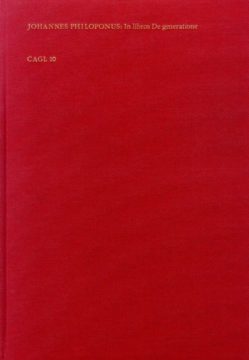Natural philosophy in the Renaissance received many ideas from Johannes Philoponus John Philoponus, ideas which contributed to the development of modern natural science: the minima naturalia, the mixture of elements, above all the theory of impetus, which contributed to Galileo‹s theory of movement. In his treatise ‹De aeternitate mundi contra Proclum‹, Philoponus renounced his Neoplatonic past in 529 and became a protagonist of the Christian doctrine of the creation of the world by God. His commentary on Aristotle, ‹De generatione et corruptione‹ belonged to an earlier time and provides some insight into the situation of natural philosophy at the time of Philoponus‘ conversion.
- Veröffentlicht am Mittwoch 31. Dezember 2003 von frommann-holzboog
- ISBN: 9783772812316
- 137 Seiten
- Genre: Aufklärung, Hardcover, Philosophie, Renaissance, Softcover
